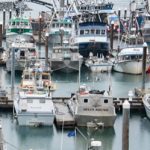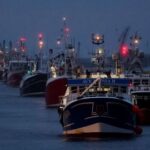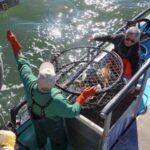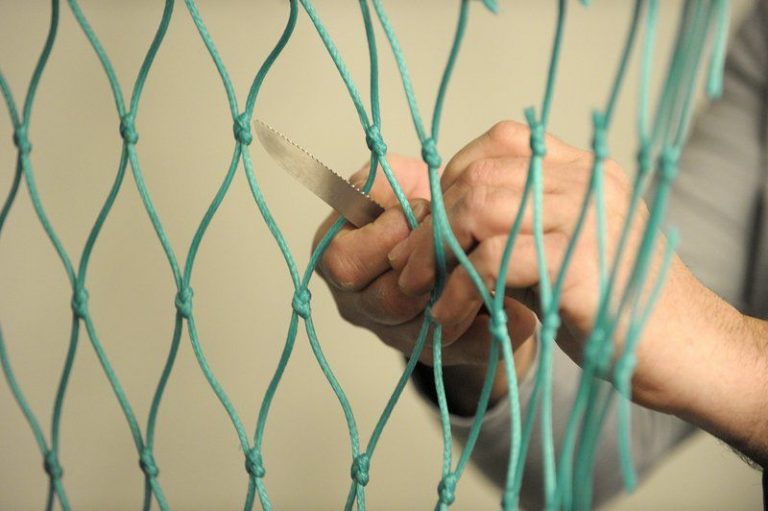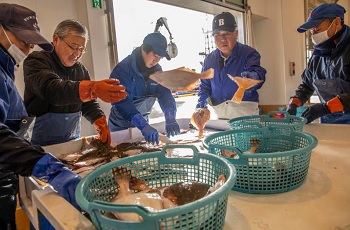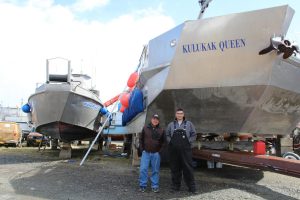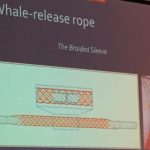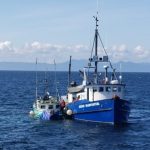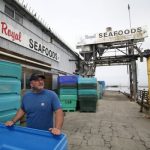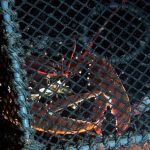Tag Archives: Dewey Hemilright
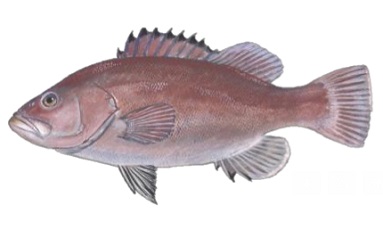
Proposed Snowy Grouper Management Measures Will Harm the Stock and Commercial Fishermen — Help Us Fight
Last fall the [SAFMC] South Atlantic Fishery Management Council approved Amendment 51 to the South Atlantic Snapper/Grouper FMP. Now the National Marine Fisheries Service (NMFS) is considering whether or not to sign it into law. Amendment 51 would modify snowy grouper management measures for the worse. It will continue to allow recreational sector over-harvesting, increase recreational dead discards, harm the stock, and deal another devastating blow to commercial fishermen in the South Atlantic. Our commercial fisheries are under attack with a 43% reduction of ACL and Amendment 51 is just the latest salvo with more to come. Now is our chance to stand up for conservation and commercial fishermen. >click to read< 10:45
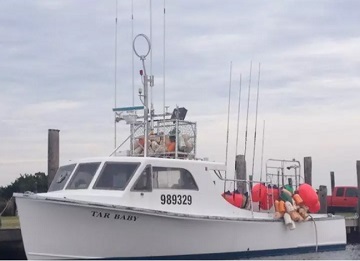
Mystery of the disappearing mahi-mahi divides fishermen
At a recent meeting of federal regulators in the Florida Keys, local fishermen raised the alarm that one of the most popular fish they go after – the dolphinfish or mahi-mahi – is fast disappearing from local waters. But industry regulators and the commercial fishing boats, say the plight of the charter boats is more complicated than that. Commercial “long line” fishing is not permitted off the Florida coast and federal regulations allocate the vast majority of the 24.5 million pounds of mahi-mahi allowed annually to the charter boats and their recreational rod-and-reel customers. They blame the larger commercial fishing vessels ,,, Photos, >click to read< 17:19
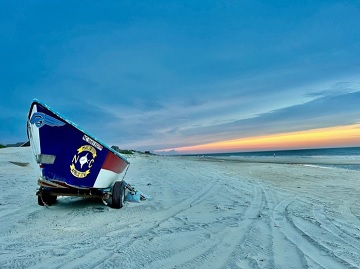
Jake Griffin of Wanchese, NC: I Feel Good About the Future
“Hard to think that I’m one of the young ones in the industry,” commercial fisherman Jake Griffin laughed. “I’m thirty!” Griffin is one the young ones given that the average age of North Carolina watermen is 52 according to a 2017 study of ocean-going fishermen. Born and raised in his homeport of Wanchese, Griffin fishes all over the map, up and down the coast of North Carolina and even out of Alaska and Maine. “I’m shark fishing now,” he said. “I’ve been fishing out of Morehead City. I trailer the boat here and there, chasing what needs to be chased – sharp noses, spinners, hammers.” Griffin began commercial fishing when he was eleven. >click to read< 09:04
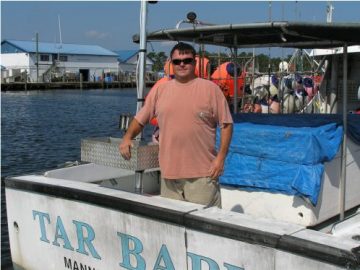
Dewey Hemilright: U.S.Fishermen in desperate need to level playing field in U.S. marketplace
The U.S.A is a member of ICCAT, which is the International body with 53 contracting party countries {CPC}with additional 6 countries having cooperating status that manages Highly Migratory species in the Atlantic Ocean,, ICCAT has a {SCRS}, which stands for {standing committee on research statistics},,, I attended as a member of U.S.A. delegation in November 15-25 ,2019 the 26th annual meeting of ICCAT in Mallorca, Spain. >click to read< 17:35
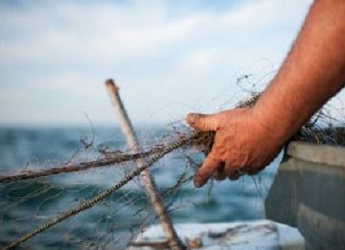
Working Watermen Commission Takes on Timely Issues at their Inaugural Meeting
The revitalized Dare County Commission for Working Watermen held their inaugural meeting on Wednesday, March 21, and tackled several pressing issues that are connected to the local fishing industry. The commission originally formed in 2008, but quietly ceased meeting in December of 2012 without formally disbanding. After public comments made by journalist and researcher Susan West at the BOC’s August 20, 2018 Dare County Board of Commissioners meeting, interest in reviving the commission was renewed, with County Commissioner Steve House signing on to be the Chairman and county commissioner representative for the endeavor. >click to read<15:13
Questions arise over commercial license fees collected for flounder fishery observers
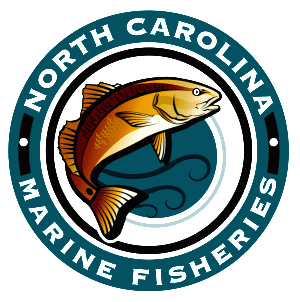 Watermen want to know what happened to commercial license fees that were collected to fund observers required by law for flounder fishing when sea turtles are spotted in area waters. Few answers were provided at a meeting of the North Carolina Commercial Fishing Resource Funding Committee on Jan. 4. Records show that $1.3 million was allocated for the observers in the 2015-2016 fiscal year, but only $608,065 was spent. Dewey Hemilright, who attended the meeting, asked how so much could have been spent on the Section 10 permit program when the flounder fishery was closed much of the season. “Expenses need more accountability,” said Hemilright, a long-line fisherman. “This doesn’t affect me, but I’m willing to pay the extra money if it allows others to fish. But if there’s more being paid in than is needed, then it should be returned to the fishermen.” An additional license fee was imposed after a state appropriation to cover the cost of complying with the federal permit’s conditions was eliminated. One condition requires the observers, who monitor interactions with endangered sea turtles and sturgeon. Read the rest here 15:53
Watermen want to know what happened to commercial license fees that were collected to fund observers required by law for flounder fishing when sea turtles are spotted in area waters. Few answers were provided at a meeting of the North Carolina Commercial Fishing Resource Funding Committee on Jan. 4. Records show that $1.3 million was allocated for the observers in the 2015-2016 fiscal year, but only $608,065 was spent. Dewey Hemilright, who attended the meeting, asked how so much could have been spent on the Section 10 permit program when the flounder fishery was closed much of the season. “Expenses need more accountability,” said Hemilright, a long-line fisherman. “This doesn’t affect me, but I’m willing to pay the extra money if it allows others to fish. But if there’s more being paid in than is needed, then it should be returned to the fishermen.” An additional license fee was imposed after a state appropriation to cover the cost of complying with the federal permit’s conditions was eliminated. One condition requires the observers, who monitor interactions with endangered sea turtles and sturgeon. Read the rest here 15:53
Can North Carolina’s Local Seafood Movement Help Save its Fishermen?
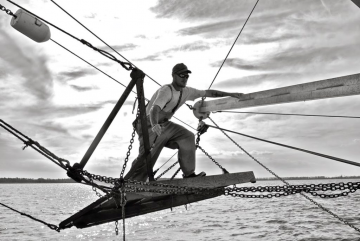 North Carolina’s commercial fishermen—who work primarily in independent, small-scale operations—landed 66 million pounds of fish last year, but rather than ending up on North Carolina plates, the majority was whisked out of state to markets where it could fetch a higher price. “I think more New Yorkers eat North Carolina seafood than North Carolinians,” says Ann Simpson, who grew up in a small town on the coast and currently directs North Carolina Catch, a partnership of smaller organizations working to strengthen the state’s local seafood economy. To fill the void created by the export of its catch, North Carolina—like most states—ships in seafood from abroad. Today, around 90 percent of the seafood Americans eat has been imported from places like China, Thailand, Canada, Indonesia, Vietnam, and Ecuador, and the average fish travels more than 5,400 miles between the landing dock and point of sale. “We don’t do one thing year-round,” says longtime fisherman Dewey Hemilright, who operates a 42-foot boat named Tar Baby out of Wanchese, North Carolina, catching tuna, swordfish, bluefish, spiny dogfish, croakers, blueline tilefish, and many others, depending on the season. “The diversity of fisheries is what makes us unique.” Read the story here 11:26
North Carolina’s commercial fishermen—who work primarily in independent, small-scale operations—landed 66 million pounds of fish last year, but rather than ending up on North Carolina plates, the majority was whisked out of state to markets where it could fetch a higher price. “I think more New Yorkers eat North Carolina seafood than North Carolinians,” says Ann Simpson, who grew up in a small town on the coast and currently directs North Carolina Catch, a partnership of smaller organizations working to strengthen the state’s local seafood economy. To fill the void created by the export of its catch, North Carolina—like most states—ships in seafood from abroad. Today, around 90 percent of the seafood Americans eat has been imported from places like China, Thailand, Canada, Indonesia, Vietnam, and Ecuador, and the average fish travels more than 5,400 miles between the landing dock and point of sale. “We don’t do one thing year-round,” says longtime fisherman Dewey Hemilright, who operates a 42-foot boat named Tar Baby out of Wanchese, North Carolina, catching tuna, swordfish, bluefish, spiny dogfish, croakers, blueline tilefish, and many others, depending on the season. “The diversity of fisheries is what makes us unique.” Read the story here 11:26
NC fishermen and their advocates say local festivals should sell local seafood
 We post a lot of articles about local festivals, for the fishermen! If the fishermen are not being served, we will not promote those festivals. We do not promote imported shrimp or Tilapia. Period. – Dewey Hemilright has spent more than half his life in North Carolina’s commercial fishing industry, but he says he has never heard a bigger fish story than the claim by the Outer Banks Seafood Festival that it promotes the harvest he and his colleagues work so hard to haul in.“It’s a deception,” he said, after first using a colorful phrase that rolls more easily off the tongue of a career waterman. “They’re telling people – or at least implying to people – who come down here that they’re going to get local North Carolina seafood. They’re not. What they’re getting is imported. But put that on your sign and see how many people show up. It’s not right. You shouldn’t have to read the fine print.” Read the story here 17:59
We post a lot of articles about local festivals, for the fishermen! If the fishermen are not being served, we will not promote those festivals. We do not promote imported shrimp or Tilapia. Period. – Dewey Hemilright has spent more than half his life in North Carolina’s commercial fishing industry, but he says he has never heard a bigger fish story than the claim by the Outer Banks Seafood Festival that it promotes the harvest he and his colleagues work so hard to haul in.“It’s a deception,” he said, after first using a colorful phrase that rolls more easily off the tongue of a career waterman. “They’re telling people – or at least implying to people – who come down here that they’re going to get local North Carolina seafood. They’re not. What they’re getting is imported. But put that on your sign and see how many people show up. It’s not right. You shouldn’t have to read the fine print.” Read the story here 17:59
Taste-test unwraps flavor of shark fishery’s potential – Commercial Fisherman Dewey Hemilright was on hand
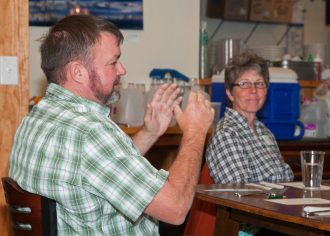 The third and final tasting event in the North Carolina Sea Grant Shark Sensory Evaluation has come and gone.,, Commercial Fisherman Dewey Hemilright was on hand to expand on Mirabilio’s presentation. Hemilright is an advocate for North Carolina commercial fishermen, a tireless educator and is active in Outer Banks Catch and the N. C. Coastal Federation and other related organizations. “These taste testing put on by Sea Grant, Sara and Cafe Lachine are most important in the future success in bringing cape shark to the consumer plates here in the U.S.,” said Hemilright. “Sara did an awesome job presenting. She gets it! This fishery is sustainable and is not overfished.” Read the rest here 09:23
The third and final tasting event in the North Carolina Sea Grant Shark Sensory Evaluation has come and gone.,, Commercial Fisherman Dewey Hemilright was on hand to expand on Mirabilio’s presentation. Hemilright is an advocate for North Carolina commercial fishermen, a tireless educator and is active in Outer Banks Catch and the N. C. Coastal Federation and other related organizations. “These taste testing put on by Sea Grant, Sara and Cafe Lachine are most important in the future success in bringing cape shark to the consumer plates here in the U.S.,” said Hemilright. “Sara did an awesome job presenting. She gets it! This fishery is sustainable and is not overfished.” Read the rest here 09:23
Dewey Hemilright: Ardent voice for Outer Banks fishing
 Outer Banks fisherman Dewey Hemilright took a busman’s holiday this summer and went to Alaska to fish for salmon. The Kitty Hawk native spent seven weeks in Dillingham, set-netting sockeye salmon in the Wood River, which flows into Bristol Bay, and experiencing another dimension of America’s commercial fishing industry. Read the rest here 21:03
Outer Banks fisherman Dewey Hemilright took a busman’s holiday this summer and went to Alaska to fish for salmon. The Kitty Hawk native spent seven weeks in Dillingham, set-netting sockeye salmon in the Wood River, which flows into Bristol Bay, and experiencing another dimension of America’s commercial fishing industry. Read the rest here 21:03


































